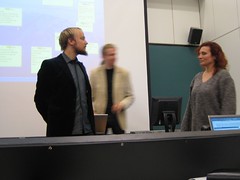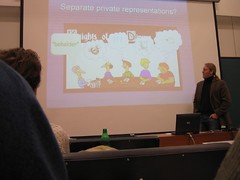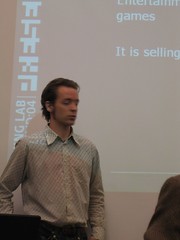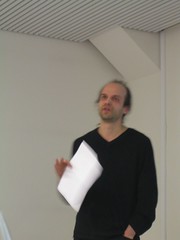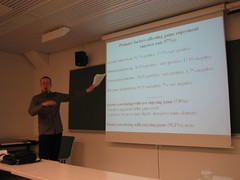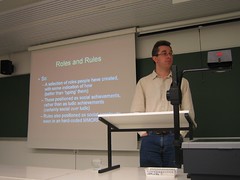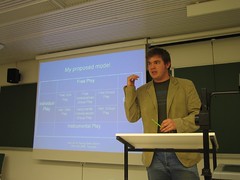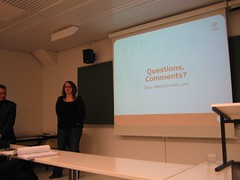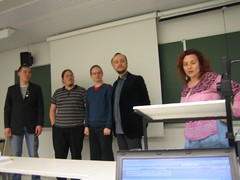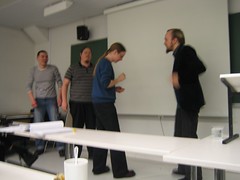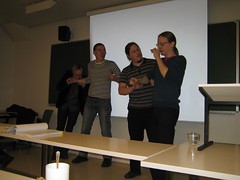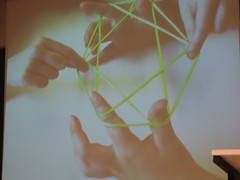Creating role playing experiences – Castle of Oulu.
freeform notes from Seminar on Playing Roles in Tampere March 2006
Starting session with briefing the players. Target group schoolchildren. 12 – 16 years, age.
Social Role Play
Using historical data. Could be used for teaching historical lore.
Characters:
1. who am I
2. what is my aim
3. what threatens me
4. what do I know.
Interaction:
- interwined plots
- conflicting goals
- “shades of gray”
- non-violent.
Wanted to find out how the games was experienced by the players.
300 players. Observed while playing, and questionnaires.
30 children per session.
In the introduction they were encouraged to role play, to try it in the environment.
Challenging, many children were very used to playing to computer games, while some had no experience. Game designed to be easy to play. For experienced players the interface was unfamiliar. No violence and limited space. Nothing else to do than socializing with other players, which is what the researchers wante them to.
Talking via headphines, all ppl close to avatar could hear. But the did stand close to many people didn’t find placer where they could talk more private, instread stand in the centre.
Found out that as a role playing game the environment warnt designed well enough. The didn’t play roles so much. But for social interaction it was very sucessful. This could be used to make new iterations that would encourage rp.
They did role play in order to reach dertain goals though.
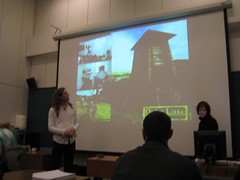
Discussion: Toni and Laura asking on how to relate to/study experience
Lisbeth: a few assumptions in the paper puzzled me. One thing is the use of real voice. Nonymity that is provided by typing can cater for playing roles. Children would immediately reconise each other.
Laura: yes, many children immediately tried to find their friends and didn’t pay much attantion to their roles and goals. But the did speak to strangers. Another limitation we had: we had 2 characters, a dog and a bird. That were played by researchers – observers. Agree that the anonymite is a bit lost by voice. Voice alteration.
Lisbeth: also the sense of having a big world: a group activity for the children could be to explore the world.
Laura: We wanted them in a small space the same, so they could gather knowledge and clues form each other. Could try exploration in larger world in another iteration. For this game it was more realistic to keep them inside the castle.
Craig: I wanted to say something about voice communication as well. Natural voices, what happen to immersion, and the need …
Laura: but would that prevent you from playing a role?
Craig: natural and modified voices doesn’t seem to work so well.
Laura: I don’t think it is the voice thing that prevents the role play. A female can play a male in a larp for example. Change of attitude.
Frans: that need to be trained.
Tomas (danish psychologist) How did you advertise/inform about the game.
Laura: brief, and during play > acceptance of the rules of the particular game.
Tony: afterwards they would get info compiled by the teachers.
Montola: Henry Jenkins “Revolution” Never winter nights. Pre civil war, slaves. Intersting to have a look at. MIT.
Red t-shirt: did you actually prepare the players for the role play – how to do?
Laura: yes even before we built the prototype we designed the brief. But not given a lengthy explanation.
Red t-shirt: isnt it unreasnobale to expect that they would know what to do and how?
Laura: the rp was only a small part of the research. Now when we have the prototype we can start implementing rp elements if that is the way we chose to go.
